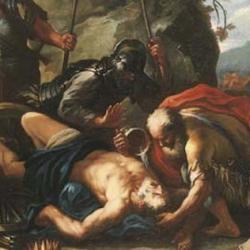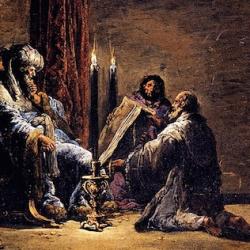The thesis of John Wright’s 1993 essay on the Chronicler’s account of David’s census (1 Chronicles 21) is implausible. Commentators, he says, have read the Chronicler’s narrative through the lens of 2 Samuel 24, which recounts the same event. Wright argues that the Chronicler doesn’t retell the story of Samuel, but subverts it.
For the Chronicler, the problem isn’t the census but Joab’s failure to complete the census. Joab should carry out the commands of the king, but he stops the census because of his own scruples. Wright points out that “God was displeased with this thing” (v. 7) immediately follows the notice that “Joab did not number Levi and Benjamin,” suggesting that in this case post hoc does mean propter hoc: “this thing” is Joab’s cessation rather than David’s original command.
But this requires Wright to argue that David is wrong to confess sin (v. 8); he confesses to a sin he didn’t commit. And it requires Wright to say that Yahweh “plays along” with David’s unnecessary confession by offering the king three judgments to choose from (vv. 9–12). The chapter idealizes David. Faced with an ambiguous, impenetrable God, David takes responsibility even for sins he didn’t commit. But it leaves Yahweh looking manipulative, a wanton god who treats people like flies, accusing for sport.
Further, Joab’s question to David—“why does my Lord seek (Heb. baqash) this thing?”—is a loaded one (as pointed out by David Gard in “The Chronicler’s David: Saint and Sinner,” Concordia Theological Quarterly 70 [2006]: 233–52). The verb has been used several times in the previous chapters of 1 Chronicles, most notably in the Psalm performed by the Levitical choir at the ark-tent in Jerusalem. David should remember the song: “Let the heart of those who seek the Lord be glad. . . . Seek the Lord and His strength, seek His face continually” (1 Chronicles 16:10–11). David doesn’t seek the Lord’s strength; he seeks strength in numbers. And he is not glad.
Wright’s thesis is, as I say, implausible. But along the way, Wright does offer some important insight into the chapter.
1 Chronicles 21 famously begins with “Then Satan stood up against Israel and moved David to number Israel.” It’s a curious statement, especially in the light of 2 Samuel 24, which attributes David’s census to Yahweh’s anger (2 Samuel 24:1). Wright points out that the Hebrew satan means “adversary,” and could refer to a human adversary (as in 1 Kings 11, where several “satans” assail Solomon). The Hebrew text lacks the definite article; this is not “the Satan” but “a satan.” Wright argues that David musters the army because of an attack from a foreign power.
That makes sense of both 2 Samuel 24 and 1 Chronicles 21. In the former, Yahweh’s anger burns and he incites David to take a census. That might mean that Yahweh implanted a desire in David (Yahweh does “stir the spirits” of men). But it might also mean that in His anger Yahweh sent a foreign power against David, a test of David’s faith. David flunks; instead of pacifying the Lord’s anger, David relies on military power. Similarly, in 1 Chronicles 21, David is moved to muster the troops because an adversary attacks.
Wright’s point about David’s responsibility can be rehabilitated. David is himself responsible for the plague. He’s not wrong to say “I have sinned greatly” (see my discussion here). He is atoning for his own sin, but he also acts on behalf of the entire nation. He pays for the threshing floor, buys the wood and animals for sacrifice, and bears the cost of the sacrifice. As king, he knows he can’t use someone else’s property to offer atonement on Israel’s behalf.
Wright highlights the specific tribes that Joab leaves out of his census—Benjamin and Levi (1 Chronicles 21:6). For Wright, this is Joab’s sin, leaving out essential tribes in violation of David’s command. But if we assume that Joab is acting righteously (and in the context of Chronicles, there’s no reason to assume otherwise), we might speculate on why the mustering of these particular tribes makes David’s command abhorrent to Joab.
Benjamites risked everything to join David while Saul was king (1 Chronicles 11–12); they are Yahweh’s gift to David, stirred up by the Spirit to join him instead of clinging to Saul (cf. 1 Chronicles 12:16–18). For David to lay hands on this tribe is a particular offense against Yahweh. Even more so the Levites, who belong to Yahweh in a unique way, His own special possession. In seizing this tribe and deploying them for his own purposes, David lays claim to Yahweh’s prerogatives.
Wright makes much of the fact that the Lord has already paused the plague before David sacrifices (1 Chronicles 21:15). More playacting: David’s sacrifice doesn’t actually do anything, in Wright’s view, since the threat has already passed.
But the Chronicler’s point is different. Yahweh’s mercy is prevenient. The story makes an essential point about temple service, consistent with the proto-temple theology found elsewhere in Chronicles. Building the temple doesn’t secure Yahweh’s mercy. It’s a provision of mercy. In the space and time opened by the angel’s pause, David purchases the temple site, constructs an altar, offers sacrifice. The sacrifice does cause the angel to sheathe his sword (v. 27), and so makes the pause permanent. Just so, the temple is built within God’s mercy; it’s a provision for continuing mercy.
(Wright, “The Innocence of David in 1 Chronicles 21,” JSOT 60 [1993]: 87–105.)














